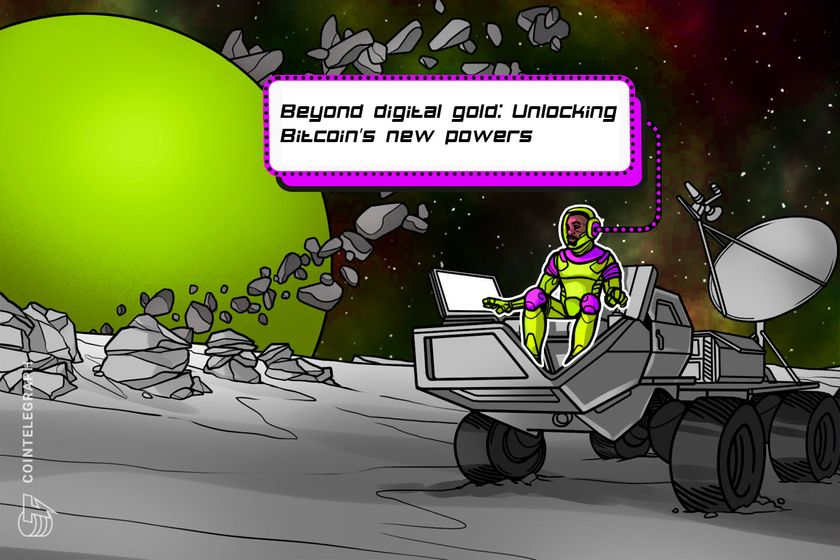In the ever-evolving world of cryptocurrency, Bitcoin (BTC) has solidly established itself as the “digital gold,” championed by proponents for its scarcity, decentralization, and the ethos of self-sovereignty. As institutional interest continues to surge, and the geopolitical landscape shifts, discussions are swirling around whether it’s time for the narrative surrounding Bitcoin to adapt. In a recent episode of The Clear Crypto Podcast, hosts Nathan Jeffay and Gareth Jenkinson sat down with veteran Bitcoiner and entrepreneur Dan Held, who posited the exciting possibility that Bitcoin’s journey could unlock a range of innovative functions beyond its current applications.
Held highlighted significant political developments, noting that with former President Donald Trump openly supporting Bitcoin—and allegedly holding it himself—there’s a palpable change in the regulatory and reputational landscape for the cryptocurrency. “We have the most open administration toward Bitcoin in the United States,” Held remarked, contrasting it with prior narratives depicting Bitcoin mining as environmentally detrimental and a tool for illicit activities. He underscored the notable fact that around 25% of Americans now own Bitcoin, a substantial increase indicating its growing acceptance.
Looking ahead, Held and Jenkinson discuss a potential transformation in Bitcoin’s role, particularly through the development of decentralized finance (DeFi) tools atop the Bitcoin blockchain. This shift could elevate Bitcoin from a mere store of value to a more dynamic asset, capable of facilitating borrowing, lending, and staking—activities usually tied to other blockchains like Ethereum. “If we could bring DeFi back to Bitcoin, then Bitcoin could utilize not just spot speculation,” Held explained, suggesting that this evolution may ultimately accelerate Bitcoin’s growth.
This enthusiasm for innovation in the Bitcoin space does not come without tension, as the clash between staunch Bitcoin maximalists and those advocating for broader functionalities continues. Referring to past conflicts such as the Bitcoin Cash fork, Held noted that today’s advancements are unfolding without altering Bitcoin’s fundamental principles. “No one’s proposing to change the rules of Bitcoin,” he stated; instead, the focus is on developing enhancements that sit atop the existing framework.
To delve deeper into this engaging discussion and hear more insights from Held, listeners are encouraged to tune into the full episode of The Clear Crypto Podcast on platforms like Cointelegraph, Apple Podcasts, or Spotify.
Bitcoin: Evolving Beyond Digital Gold
Key points from the discussion about Bitcoin’s future and its broader implications include:
- Changing Narrative
- The perception of Bitcoin is shifting as institutional interest grows and geopolitical dynamics evolve.
- US President Donald Trump’s endorsement signals a more welcoming environment for Bitcoin in politics.
- Growing Adoption
- Approximately 25% of Americans now own Bitcoin, indicating a significant rise in mainstream acceptance.
- This broad ownership could further entrench Bitcoin as a staple asset for everyday investors.
- Decentralized Finance (DeFi) Integration
- Exploring the potential of DeFi tools on Bitcoin could expand its functionality beyond a mere store of value.
- Mechanisms such as borrowing, lending, and staking could attract more users and increase Bitcoin’s utility.
- Tension Within the Community
- The dichotomy between Bitcoin purists and advocates of innovation presents a potential challenge for the asset’s evolution.
- The discussion around DeFi on Bitcoin is happening without changing its fundamental rules, maintaining its core principles.
Bitcoin’s evolution may impact your life by providing new opportunities for financial interaction and investment, making it more accessible and functional for everyday use.
Bitcoin’s Evolving Narrative: DeFi and Political Winds
The ongoing evolution of Bitcoin (BTC) as it transitions from a “digital gold” label to a more multifaceted asset is currently making waves in the cryptocurrency landscape. In a recent episode of The Clear Crypto Podcast, industry experts highlight how significant political shifts and an influx of institutional interest may redefine the cryptocurrency’s role in the market. This transformation brings competitive advantages that could enhance its usability and reach, but there are also notable drawbacks to consider.
Advantages of the Evolving Bitcoin Narrative
One of the primary advantages is the growing acceptance of Bitcoin by influential political figures, including US President Donald Trump, which could signal favorable regulations and public perception. This political backing represents a marked departure from the often negative rhetoric surrounding cryptocurrency, positioning Bitcoin as a legitimate asset class. The podcast suggests that as more people become familiar with Bitcoin’s potential beyond mere speculation, the asset could enable innovative financial mechanisms by incorporating decentralized finance (DeFi) functionalities traditionally linked to platforms like Ethereum and Solana.
Integrating DeFi could expand Bitcoin’s appeal, allowing for activities such as borrowing, lending, and staking—all enhancing its utility as not just a store of value but a versatile financial instrument. By bridging the gap with DeFi, Bitcoin could attract a broader demographic, including traditional investors looking for growth opportunities.
Disadvantages and Potential Cautions
However, this potential growth comes with its own set of challenges. The podcast touches upon the resistance from “Bitcoin puritans” who staunchly oppose any attempts to alter the foundational principles that have shaped Bitcoin’s identity. This internal conflict could fracture loyalty within the community, leading to divisions similar to historical events like the Bitcoin Cash fork. The introduction of extensive DeFi capabilities might alienate a segment of Bitcoin’s core supporters who prefer a more “pure” interpretation of its purpose.
Additionally, the novelty of integrating complex DeFi mechanisms poses operational risks and regulatory challenges that necessity thorough consideration. If not managed correctly, these factors could tarnish Bitcoin’s reputation especially as the market is still vocal about environmental concerns and illegal activities historically associated with its usage.
Who Stands to Gain or Face Challenges?
This evolving landscape could significantly benefit a variety of stakeholders, including retail investors eager for enhanced functionality and financial institutions looking to leverage the perceived stability of Bitcoin. Conversely, the changes may create friction among die-hard Bitcoin advocates, affecting community cohesiveness. The ongoing narrative shift also poses a challenge for regulators who will need to adapt to these new functionalities, potentially leading to increased scrutiny and developing regulations that could either benefit or hinder Bitcoin’s growth trajectory in the financial ecosystem.
As Bitcoin navigates this complex terrain, it’s clear that its future development will impact not only its holders but also broader financial markets and regulatory landscapes worldwide.

















